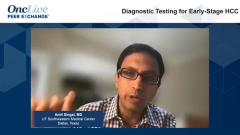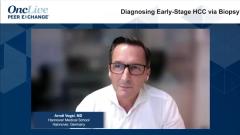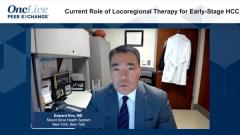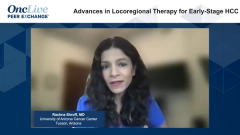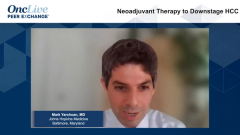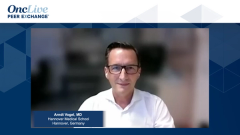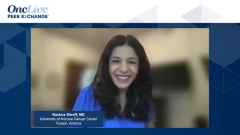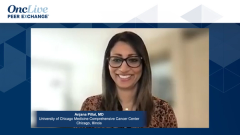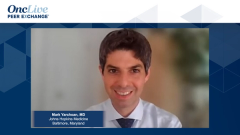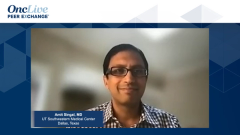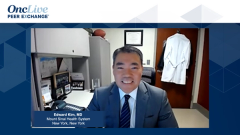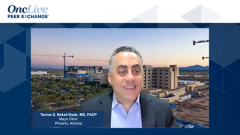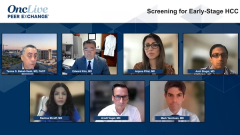
Optimizing Precision Medicine in HCC
Takeaways from a discussion on treatment advances in hepatocellular carcinoma.
Episodes in this series

Tanios S. Bekaii-Saab, MD, FACP: I want to thank all of you for this rich and incredibly informative discussion. I learned quite a bit from listening to you. All of you are experts in the field. Thank you. Before we conclude, you’re not going to get away easily. I’d like to get final thoughts from each of you. I’m going to start with Dr Kim.
Edward Kim, MD: The future hopefully will be in combination therapies with locoregional therapy and checkpoint inhibitors with or without TKIs [tyrosine kinase inhibitors] and will ultimately benefit patients. Practicing within a multidisciplinary setting is the standard of care.
Tanios S. Bekaii-Saab, MD, FACP: Great. Dr Pillai?
Anjana Pillai, MD: I’m going to echo Dr Kim. Multidisciplinary care is of utmost importance for these patients and content evaluation. The idea of biomarkers to liquid biopsy for prognostication, treatment recurrence, all these things that we’ve been talking about—that’s what we’re waiting for the out for.Hopefully some of these data will pan out soon.
Tanios S. Bekaii-Saab, MD, FACP: Thank you. Dr Singal?
Amit Singal, MD: I completely agree with Ed and Anjana in terms of the importance of multidisciplinary care. In terms of adding another thought, I’d go back to where we started the program, that early detection is critical, and that we should be performing surveillance in our at-risk patients. We have curative therapies available if somebody is found at an early stage. We should be doing that even when possible. To build off that, Anjana brought up the ability of down staging and shifting to the left. It’s an exciting time to see the responses that we’re already seeing and going up from there. Likewise, when somebody presents, if somebody does get down staged, always consider how we can cure these patients. Mark brought up that systemic therapy is curable in other diseases, and we need to make the same case in HCC [hepatocellular carcinoma].
Tanios S. Bekaii-Saab, MD, FACP: Thank you. Dr Shroff?
Rachna Shroff, MD: I’d echo that with the multidisciplinary care and management, remember to involve and engage the medical oncologists, because we now have therapies that can work hand in hand and can hopefully even shift people into curative approaches. As I said, it’s a good problem to have so many systemic therapies. The other thing I’d add is that as we get more treatments and learn more about safety profiles, it’s going to be important for us to pay attention to things like quality-of-life data and understanding how those things impact our practice approaches. My clinical trial had as many patients as we could put on clinical trials, so we can see what it’s done. It’s completely changed the face of treatment for this disease. For patients in the localized and advanced setting, it’s really important to put them on trials.
Tanios S. Bekaii-Saab, MD, FACP: Thank you, Dr Vogel.
Arndt Vogel, MD: I’d like to repeat what was said before. The multidisciplinary team is really important. What we see at the moment is a shift. In the past we’ve used too many local therapies. Now we see too much systemic therapy. A lot of colleagues in the community don’t present the patient in the tumor board any. They start atezolizumab plus bevacizumab and go on with sorafenib. They come to us, and we think, “That would have been a good candidate for liver transplantation.” That’s a problem. We need to educate, at least here in Europe and in Germany, our colleagues in the oncology field to include the patient in multidisciplinary tumor boards, and on this concept of down staging to local therapies to cure the patient. That’s fascinating, and we need to do everything possible. The last point is biomarkers. Going back to the beginning of our discussion we need biomarkers, and we need to implement them. We need tissue or liquid biopsy to move our feet forward to precision medicine.
Tanios S. Bekaii-Saab, MD, FACP: Excellent. Last but not least, Dr Yarchoan.
Mark Yarchoan, MD: It’s because of my last name. I’m always last.
Tanios S. Bekaii-Saab, MD, FACP: See, that’s why I pick the guys up. Always go first.
Mark Yarchoan, MD: Some of what I’m going to say is a repeat, but there’s never been a more exciting time to be treating HCC. The multidisciplinary care has never been more important. There was a time when intermediate-stage disease got locoregional therapy. The second that the tumor touched a major vessel, or there was a single portal node, we suddenly said, “This is advanced disease,” and it was destination sorafenib. We’re now realizing that HCC is heterogeneous, and it’s a continuum. There’s probably a role for systemic therapy in earlier stages of disease. At the same time, there may be a role for a locoregional therapy and the earlier Barcelona Clinic Liver Cancer C stage. We all need to work together around patients in a multidisciplinary way. The future of HCC has never been brighter.
Tanios S. Bekaii-Saab, MD, FACP: Excellent. I like that note. Thank you. And to our viewing audience, we hope you found this…
Arndt Vogel, MD: What’s your final take-home message?
Tanios S. Bekaii-Saab, MD, FACP: I’m here to observe, listen, and learn like our audience. Thank you again. To our viewing audience, we hope you found this OncLive® Peer Exchange® to be useful and informative. Thank you.
Transcript Edited for Clarity


